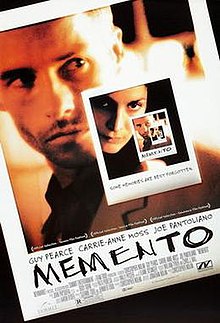
Back تذكار (فيلم) Arabic تذكار ARZ Memento (film, 2000) AZ Мементо Bulgarian মেমেন্টো (চলচ্চিত্র) Bengali/Bangla Memento (film) BR Memento BS Memento Catalan Memento (pelikula) CEB یادگاری (فیلم) CKB
| Memento | |
|---|---|
 Theatrical release poster | |
| Directed by | Christopher Nolan |
| Screenplay by | Christopher Nolan |
| Based on | "Memento Mori" by Jonathan Nolan |
| Produced by | |
| Starring | |
| Cinematography | Wally Pfister |
| Edited by | Dody Dorn |
| Music by | |
Production companies |
|
| Distributed by | Newmarket |
Release dates |
|
Running time | 113 minutes[1] |
| Country | United States[2] |
| Language | English |
| Budget | $5–9 million[3][4] |
| Box office | $40.1 million[5][3] |
Memento is a 2000 American neo-noir psychological thriller film written and directed by Christopher Nolan, based on the short story "Memento Mori" by his brother Jonathan Nolan, which was later published in 2001.[6] The film stars Guy Pearce, Carrie-Anne Moss, and Joe Pantoliano. The film follows Leonard Shelby (Pearce), a man who suffers from anterograde amnesia—resulting in short-term memory loss and the inability to form new memories—who uses an elaborate system of photographs, handwritten notes, and tattoos in an attempt to uncover the perpetrator who killed his wife and caused him to sustain the condition.
The film's non-linear narrative is presented as two different sequences of scenes interspersed during the film: a series in black-and-white that is shown chronologically, and a series of color sequences shown in reverse order (simulating for the audience the mental state of the protagonist). The two sequences meet at the end of the film, producing one complete and cohesive narrative.[7]
Memento premiered at the Venice Film Festival on September 5, 2000, and was theatrically released in the United States on March 16, 2001. It was acclaimed by critics, who praised its nonlinear structure and themes of memory, perception, grief, and self-deception. It was also a commercial success, earning $40 million over its $9 million budget and gained a cult following. Memento received many accolades, including the Waldo Salt Screenwriting Award at the Sundance Film Festival, and Academy Award nominations for Best Original Screenplay and Best Film Editing.[8] In 2017, the United States Library of Congress deemed the film "culturally, historically, or aesthetically significant" and selected it for preservation in the National Film Registry.
- ^ "Memento". British Board of Film Classification. Archived from the original on June 4, 2020. Retrieved June 10, 2013.
- ^ "Memento (2000)". British Film Institute. Archived from the original on July 13, 2012. Retrieved June 14, 2014.
- ^ a b "Memento (2001)". Box Office Mojo. Archived from the original on August 9, 2022. Retrieved February 12, 2021.
- ^ "Memento (2001) - Financial Information". The Numbers. Archived from the original on April 2, 2023.
- ^ Mottram 2002, p. 177.
- ^ "Memento (2000)". AllMovie. Archived from the original on January 22, 2022. Retrieved November 8, 2021.
- ^ Klein, Andy (June 28, 2001). "Everything you wanted to know about "Memento"". Salon. Archived from the original on June 15, 2020. Retrieved September 4, 2012.
- ^ "The 74th Academy Awards". oscars.org. Archived from the original on October 1, 2014. Retrieved May 5, 2023.